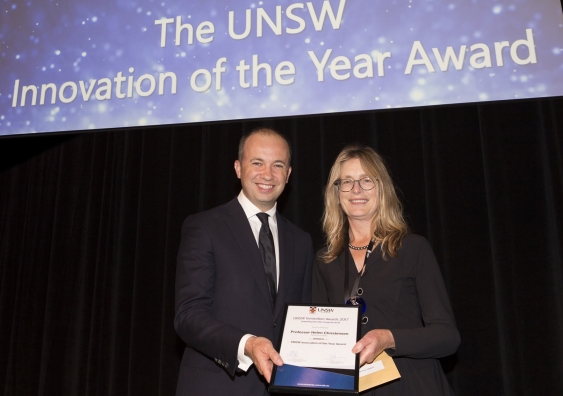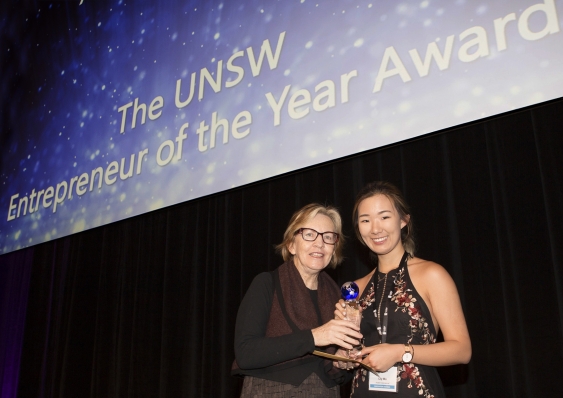Digital mental health research wins major innovation award
Mental health apps, an automated logistics transport management system and a sun exposure sensor were among the winners at the 2017 UNSW Innovation Awards.
Mental health apps, an automated logistics transport management system and a sun exposure sensor were among the winners at the 2017 UNSW Innovation Awards.

Mental health apps, an automated logistics transport management system and a sun exposure sensor were among the winners at the 2017 UNSW Innovation Awards.
Digital Dog, a research group within the UNSW research affiliate the Black Dog Institute, was named winner of the Innovation of the Year Award.
The Digital Dog group works to use technology to solve common mental health problems, developing and testing online mobile apps, websites and games to help lower depression, lower suicide risk, reduce stress and promote wellbeing.
UNSW Scientia Professor Helen Christensen, Director of the Black Dog Institute and leader of the Digital Dog team, was presented with the award by NSW Minister for Innovation and Better Regulation Matt Kean at an event at the Westin Hotel on Wednesday night.
"Mental health problems are widespread but not well understood. The Black Dog Institute is unique in tackling the causes and treatments of mental illness," Professor Christensen says.
"It is also extraordinary in its commitment to making sure that research findings make their way into healthcare and public health forums. This 'translational' focus is critical."
The UNSW Innovation Awards celebrate the diversity and value of innovation originating from UNSW staff, alumni and students.
Since being established in 2009, more than 50 awards in numerous categories have been presented to over 150 finalists.
Other winners of 2017 awards included:
Lily Wu, Entrepreneur of the Year, for Austern International, a training platform that places students in some of the world’s biggest tech companies across five cities, generating an annual revenue of more than $1 million.
Brad Lorge, winner of the Outstanding Startup Award with Premonition, an automated logistics transport management system that optimises fleets in real-time. Using predictive intelligence, it adapts to traffic congestion, delays and missed deliveries, saving time and resources.
Professor Justin Gooding, winner of the Enterprise Award for Engagement for his Sun Patch, Sun Exposure Sensor. The invention uses innovative technologies to create cheap, printable and easy-to-use sun exposure sensor stickers.
Scientia Professor Michelle Simmons, winner of the Enterprise Award for Impact for Silicon Quantum Computing Pty Ltd, which aims to produce a working quantum integrated circuit within five years.
The Innovation Awards, hosted by the Division of Enterprise, are part of the UNSW Innovation Summit, a major annual event bringing together those who are leading strategies, unlocking opportunities and delivering cutting-edge technologies.
Brian Boyle, Deputy Vice-Chancellor Enterprise, said: "I’m proud to honour and reward the exceptional creativity of every entrant, and every finalist in the UNSW Innovation Awards."

NSW Chief Scientist & Engineer Professor Mary O'Kane with Entrepreneur of the Year Award winner Lily Wu. Photo: Supplied